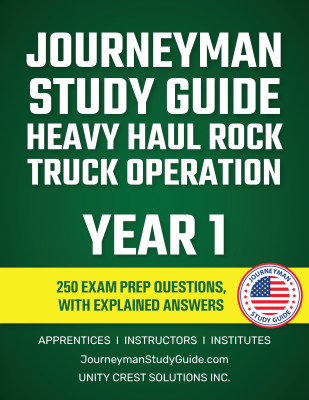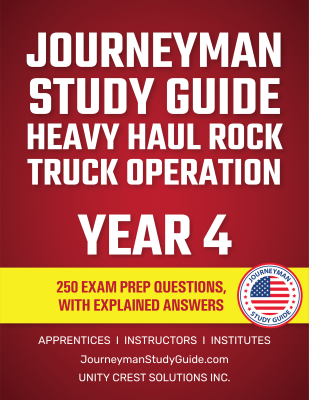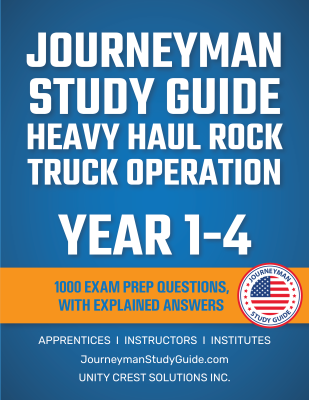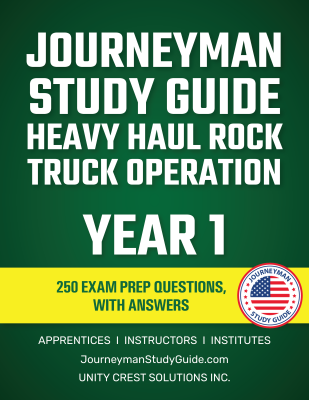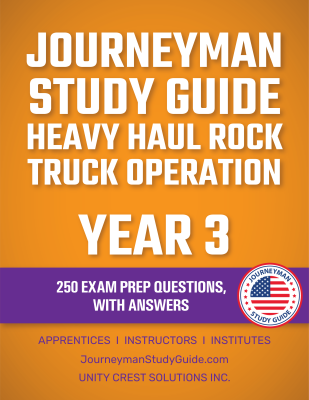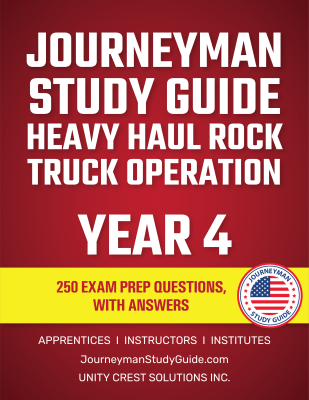Questions, Answers, & Explanations
Get clear explanations behind every answer, perfect for deeper learning and more thorough exam preparation.
Site Updates in Progress: Things might look different as we work on enhancing your experience.
What is a Heavy Haul Rock Truck Operator?
Heavy Haul Rock Truck Operators are skilled equipment professionals who operate off-highway, high-capacity trucks designed to carry massive loads of earth, rock, and aggregate. These trucks—often weighing over 100 tons—are critical to large-scale construction, mining, and excavation operations across the United States. Whether working in surface mines in Nevada, construction zones in Texas, or quarry pits in Pennsylvania, operators ensure efficient material movement on rugged terrain.
These vehicles include articulated and rigid-frame dump trucks manufactured by leading American companies like Caterpillar, John Deere, and Komatsu America Corp. Operators must be proficient in navigation, load management, and safety procedures to maintain performance and prevent equipment damage.
Key Responsibilities
Operators perform a range of tasks that require machine control, site awareness, and equipment maintenance:
Skills and Traits for Success
Where Rock Truck Operators Work
Why Choose This Career?
Ready to Start Your Rock Truck Career?
Prepare with our Online Tests, Q&A sets, and Q/A Explanation products to build your knowledge, improve safety awareness, and pass certification exams.
What to Expect on the Rock Truck Operator Certification Exam
The certification exam for Heavy Haul Rock Truck Operators is designed to evaluate your knowledge of safe operation, equipment inspection, and best practices for working in excavation, mining, and heavy construction sites. Employers across the U.S.—including companies like Martin Marietta, Vulcan Materials, and Granite Construction—expect operators to meet safety and performance standards set by OSHA, MSHA, and state agencies.
Training and exams are often offered through vocational schools, union programs, and operator training centers accredited by the National Center for Construction Education and Research (NCCER).
Exam Format
Key Topics Covered
Passing Requirements
A passing score is generally 70% or higher. For hands-on exams, candidates must demonstrate safe start-up, operation, dump control, and shutdown procedures with attention to situational awareness.
Tips for Exam Success
Ready to Get Certified?
Start training with our expert-designed materials and prepare to pass your rock truck exam with confidence.
What Types of Questions Are on the Rock Truck Operator Exam?
The Rock Truck Operator Certification Exam assesses your ability to safely and efficiently operate heavy off-road haul trucks in construction, mining, and excavation environments. The exam includes real-world scenarios, safety compliance questions, and technical knowledge checks—mirroring the conditions you’ll face on active U.S. job sites.
Common Question Formats
Sample Questions
1. Pre-Operation Inspection
Question: What is the primary reason for checking rock truck tire pressure before beginning a shift?
2. Operating Safely
Question: When descending a steep grade with a full load, which system should be used to maintain control?
3. Haul Road Communication
Question: What does a raised truck bed signal when entering a haul road?
4. Math for Operators
Question: If a haul cycle takes 12 minutes and you complete five cycles per hour, how many tons are moved in an hour using a 50-ton truck?
Tips for Answering Questions
Get Exam-Ready with Real Practice
Our Q/A Explanation products help you understand the "why" behind each correct answer, while Online Tests simulate the timed pressure of the real exam.
What Is It Like to Work as a Rock Truck Operator?
A day in the life of a Heavy Haul Rock Truck Operator is rooted in safety, precision, and coordination. Whether you’re moving overburden in a Nevada gold mine or transporting rock at a Texas quarry, the job demands constant awareness, smooth equipment handling, and stamina to work long shifts in extreme environments.
Rock truck operators often work 10- to 12-hour shifts on job sites ranging from open-pit mines and oil field pads to highway construction zones and aggregate facilities.
Morning: Safety First and Pre-Shift Prep
The day starts early—usually around 5:30 or 6:00 AM—with:
Midday: Loading, Hauling, Dumping
Most of the shift is spent cycling between loading and dump zones:
Afternoon: Wrap-Up and Reporting
Toward the end of the day:
Challenges and Rewards
Challenges:
Rewards:
Ready for the Driver’s Seat?
Our study guides, Q&A products, and Online Tests give you the knowledge and skills to operate rock trucks safely and confidently.
What Are the Long-Term Benefits of a Rock Truck Operator Career?
Operating a heavy haul rock truck isn’t just a job—it’s a career path in the heart of American infrastructure and resource industries. From highways to mines, certified operators are in demand and can grow into supervisory and multi-equipment roles with experience and additional certifications.
Whether you start at a mine in Colorado or a quarry in Georgia, the skills you build behind the wheel can open doors to long-term advancement and financial stability.
Career Progression
High-Demand Industries & Employers
Union Support & Career Security
Why Choose This Career?
How Much Can You Earn as a Rock Truck Operator?
Wages for Heavy Haul Rock Truck Operators in the U.S. are strong, especially for those working in mining, heavy construction, and unionized positions. These operators handle some of the largest machines on Earth, and their pay reflects the responsibility, skill, and safety demands of the job.
General Wage Ranges
Regional Wage Variations
Factors That Affect Wages
Want to Boost Your Earning Potential?
Use our Online Tests, Q&A sets, and Q/A Explanations to improve your knowledge, pass certifications, and qualify for higher-paying operator roles.
What Tools and Resources Do Rock Truck Operators Use?
Operating a heavy haul rock truck requires more than just power—it demands control, awareness, and the right tools. From pre-shift inspections to GPS haul planning, modern operators depend on rugged equipment and reliable resources to stay safe, productive, and certified.
Essential Tools for Operators
Recommended Learning Resources
Why the Right Tools and Training Matter
Quality equipment and up-to-date training not only improve efficiency—they prevent costly mistakes, protect jobsite safety, and keep you employable.
Where Can You Learn Rock Truck Operation in the U.S.?
Training for Heavy Haul Rock Truck Operation is available through technical colleges, union apprenticeship programs, and employer-sponsored schools. These programs prepare students to operate large off-road dump trucks safely and efficiently under OSHA, MSHA, and DOT regulations. Whether entering the mining sector or heavy construction, American training programs offer hands-on experience and industry-recognized certification pathways.
Types of Training Programs
What You'll Learn
Choosing the Right Program
Want to Get Certified Faster?
Pair your training with our study guides, Q&A sets, and Online Tests to ensure you’re fully prepared for the exam and jobsite.
Why Join a Union or Work with Top U.S. Employers?
Union membership and reputable employers provide rock truck operators with job security, high wages, benefits, and safe working environments. Whether you’re moving overburden in a Nevada mine or hauling rock at a highway project in Texas, union-backed roles and top employers offer steady advancement opportunities.
Benefits of Joining a Union
Leading Unions for Rock Truck Operators
Top Employers Hiring Rock Truck Operators
How to Get Connected
Get Ready to Work with the Best
Use our Q&A guides, Online Tests, and Q/A Explanations to earn the certifications employers want and join the union networks that lead to lifelong careers.
How to Stay Ahead in the Rock Truck Industry
Heavy haul rock truck operation continues to evolve alongside advancements in mining, construction, and safety technology. Staying competitive in this field means understanding emerging tools, compliance standards, and industry trends. With infrastructure projects growing across the U.S. and mining activity expanding, there’s never been a better time to build a long-term future in this trade.
Emerging Trends in Haul Truck Operation
Best Practices for Career Growth
Opportunities & Challenges
Opportunities
Challenges
Sustainability in Practice
Stay Trained. Stay Competitive.
Our study guides, Online Tests, and Q/A Explanations are built to help you stay current, pass exams, and thrive in a rapidly advancing industry.
Get clear explanations behind every answer, perfect for deeper learning and more thorough exam preparation.
Quick and easy practice to test your knowledge anytime, anywhere—ideal for simple, on-the-go preparation.

